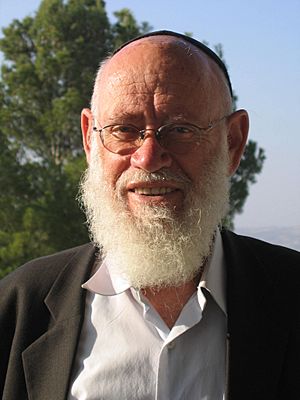Moshe Levinger facts for kids
Moshe Levinger (born 1935 – died May 16, 2015) was an Israeli Rabbi and an important leader in a movement that encouraged Jews to live in areas that Israel gained control of after the Six-Day War in 1967. He was especially known for helping Jewish families settle in Hebron starting in 1968. He was also a key figure in a group called Gush Emunim, which was formed in 1974 to support Jewish settlement.
Early Life and Learning
Moshe Levinger was born in Jerusalem in 1935. He studied at a special Jewish religious school called Mercaz HaRav yeshiva in Jerusalem. His teacher, Rabbi Zvi Yehuda Kook, taught him that the Land of Israel should be under Jewish control, not just by having communities there, but by having full Jewish authority over the land.
Leading the Settlement Movement
When the 1967 war happened, Rabbi Levinger was a rabbi in a religious farming community called Nehalim. He worked with another group to help Jewish families return to an area called the Etzion Bloc, which had been empty since 1948. He believed that new communities should be built even without waiting for the government's full approval.
Rabbi Levinger first came to Hebron in 1968, after Israel took control of the West Bank during the Six-Day War. He rented rooms in a hotel in Hebron to celebrate the Jewish holiday of Passover Seder, and then he decided to stay. After talking with the Israeli government, he and his family moved to an old army base near Hebron. There, with the government's help, they started a new community called Kiryat Arba.
In 1992, Rabbi Levinger started a political party called "Torah VeEretz Yisrael" (which means Torah and Land of Israel). He ran in the Knesset elections that year, but his party did not get enough votes to enter the parliament. Rabbi Levinger had a large family, including a wife, 11 children, and 50 grandchildren. Many of them live in the West Bank. His wife, Miriam, and some of his children are also known for their work in the settlement movement.
Later Years and Legacy
After 2000, Rabbi Levinger's health began to decline, and he was not as active in the settlement movement. He passed away on May 16, 2015, in a hospital in Jerusalem. He was buried in the Ancient Cemetery in Hebron.
After his death, the Prime Minister of Israel, Benjamin Netanyahu, sent a letter to Rabbi Levinger's family. He said that Rabbi Levinger was "an outstanding example of a generation that sought to realize the Zionist dream," especially after the Six-Day War.
See also
- Gush Emunim
 | Jewel Prestage |
 | Ella Baker |
 | Fannie Lou Hamer |


